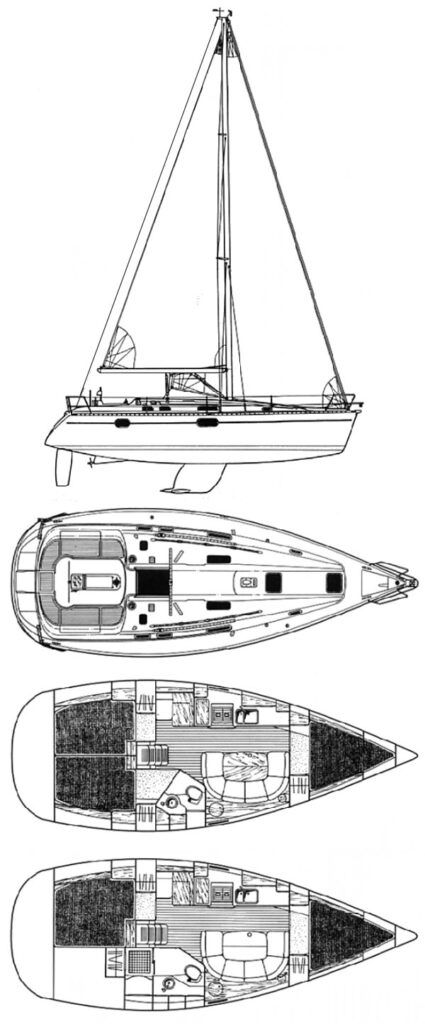The Beneteau Oceanis 351, first launched in 1994, emerged as a highly successful cruising sailboat designed for comfortable family sailing and enjoyable coastal voyages. Celebrated for its blend of performance and spacious accommodations, it quickly gained a reputation as one of the most popular 35-footers in Europe during its production run. Built by the renowned French shipyard Beneteau, the Oceanis 351 embodies the builder's philosophy of balancing performance, comfort, and affordability, making well-built yachts accessible to a broad range of sailors.
Oceanis 351 (Beneteau) Information, Review, Specs

- Make
- Beneteau
- Model
- Oceanis 351
- Number Built
- Production Year(s)
- 1994 - ??
History and Design
The creation of the Oceanis 351 is rooted in Beneteau's long history of innovation, particularly their embrace of fiberglass construction in the 1960s, which revolutionized their ability to produce recreational sailboats. The Oceanis 351, produced from 1994, was designed by the notable naval architecture firms Jean Berret and Olivier Racoupeau (Berret-Racoupeau Yacht Design). Their design philosophy for this model aimed to create a yacht that offered exciting yet safe coastal sailing, with a focus on comfortable and spacious interiors that could even outperform other production boats in its class. While the core design remained consistent, the Oceanis 351 was available in two and three-cabin layouts, with the two-cabin version also known as the Moorings 352 and the three-cabin version as the Moorings 353. The Oceanis 351 shares significant similarities with the slightly later Oceanis 352, to the point of being nearly identical in some aspects.
Sailing Performance and Handling
The Beneteau Oceanis 351 is designed as a capable coastal cruiser, balancing sail-carrying ability with stability. With a sail area to displacement ratio (SA/D) of approximately 16.3, she is well-suited for varied conditions, offering good performance in moderate breezes without being overly sensitive in heavier air. Her ballast to displacement ratio (B/D) of around 0.32 suggests a moderate level of stiffness, providing a comfortable motion in a seaway. The displacement to length ratio (D/L) of approximately 185.2 indicates a relatively light displacement for its length, contributing to its satisfying sailing performance. The boat is characterized by its wide beam, which contributes to roomy cabins and wide berths, while also offering a stable platform under sail. Owners generally find her easy to handle and well-balanced, making her a pleasant vessel for family cruising.
Accommodations and Layout
The interior of the Beneteau Oceanis 351 is renowned for its spaciousness and comfortable layout, a direct result of its generous beam, which was considered particularly wide at the time of its launch. The boat was offered with either a two- or three-cabin configuration, catering to different owner needs. While specific headroom figures are not consistently documented across all reviews, the overall impression is one of ample space. Typical layouts include a comfortable V-berth forward, a large aft cabin (or two aft cabins in the three-cabin version), a spacious salon, a functional galley, and a head with a shower. The interior design, by Armel, is described as tasteful and classic, with an open saloon contributing to a pleasant atmosphere at anchor. Owners often praise the roomy cabins with wide berths and the solid, centrally mounted cockpit table which breaks up the wide cockpit area and often includes an integral cooler.
Owner's Perspectives
Owners of the Beneteau Oceanis 351 consistently highlight its suitability as a family boat and its enjoyable, safe coastal cruising capabilities. Many consider it a perfect size for a couple with occasional guests, noting its ease of handling and comfortable motion. The boat is often praised for its general robustness, with problems typically limited to routine maintenance issues. Some discussions among owners revolve around the slight differences between the 351 and 352 models, with the 352 sometimes noted for a larger sail area. While some older Beneteau vessels can experience corrosion issues over time due to exposure, this is generally a function of age and maintenance rather than a specific design flaw of the 351. The active community of Beneteau owners, often found in online forums, provides a valuable resource for sharing experiences and addressing common queries.
Measurements
Construction & Hull
- Construction Material
- Fiberglass (Solid)
- Hull Type
- Monohull Sailboat
- Keel Type
- Fin
- Rudder
- 1x Spade
- Ballast
- 3748 lbs
- Displacement
- 11684 lbs
- Water Capacity
- -
- Fuel Capacity
- -
Engine
- Engine Make
- Volvo Penta
- Engine Model
- —
- Engine Type
- —
- Engine HP
- —
- Engine Count
- 1
- Drive Type
- —
- Fuel Type
- Diesel
Rig & Sails
- Rig Type
- Masthead Sloop
- P (Main Luff)
- -
- E (Main Foot)
- -
- I (Foretriangle Height)
- -
- J (Foretriangle Base)
- -
- Forestay Length (est)
- -
- Main Sail Area
- -
- Foretriangle Sail Area
- -
- Total Sail Area (Reported)
- 526 sqft
- Total Sail Area (Calc)
- -
Dimensions
- LOA
- 34.83 ft
- LWL
- 30.42 ft
- Beam
- 12.42 ft
- Draft
- 4 ft
- Max Headroom
- -
- Air Draft
- -
Calculations
- Hull Speed
- 7.39 kn
- Pounds per Inch Immersion
- 1